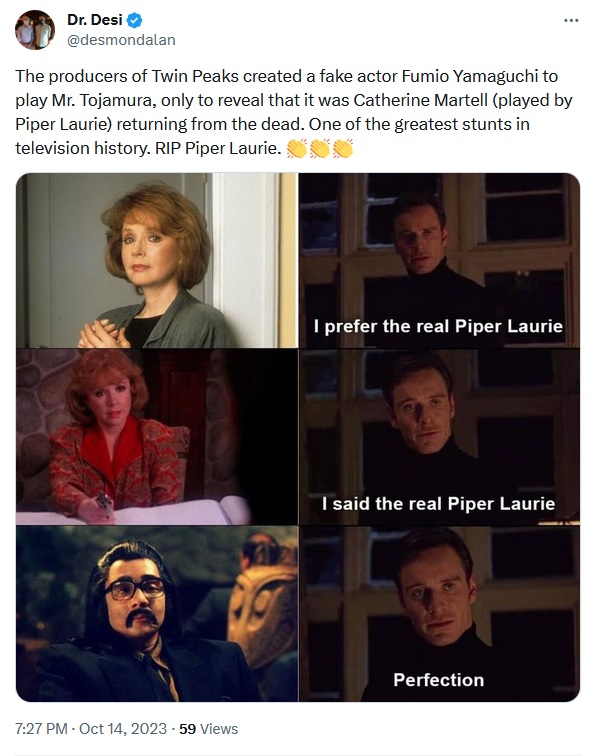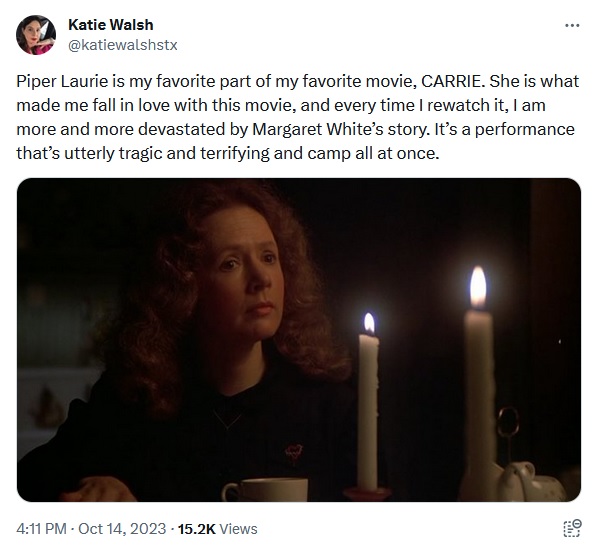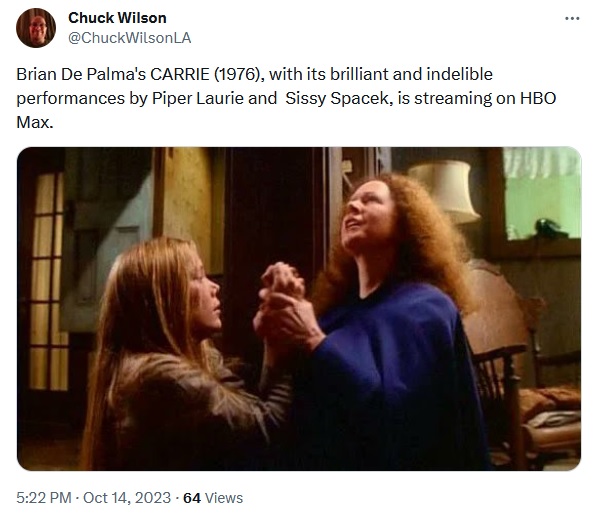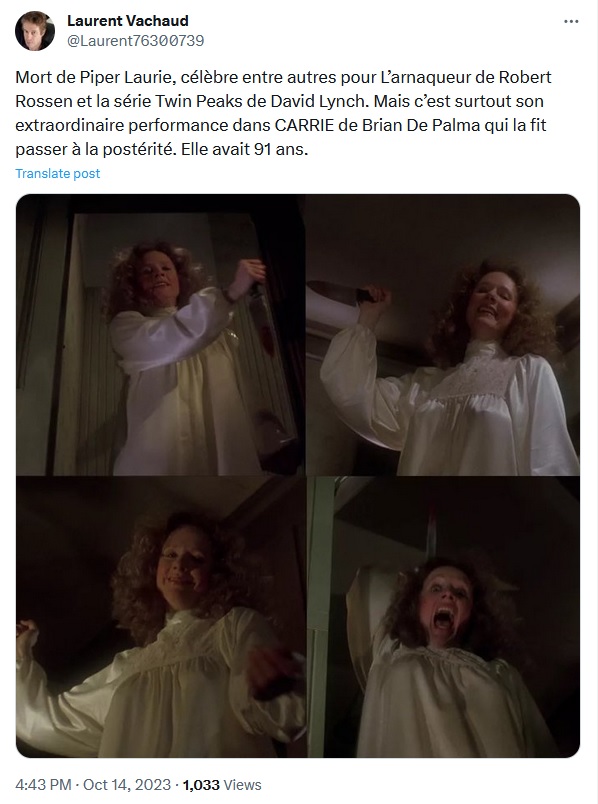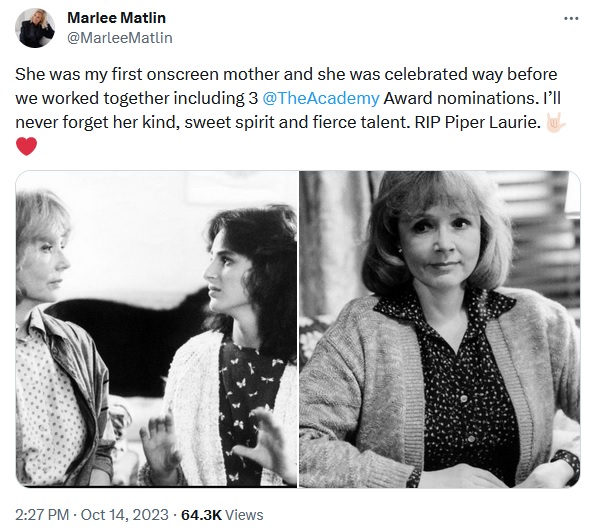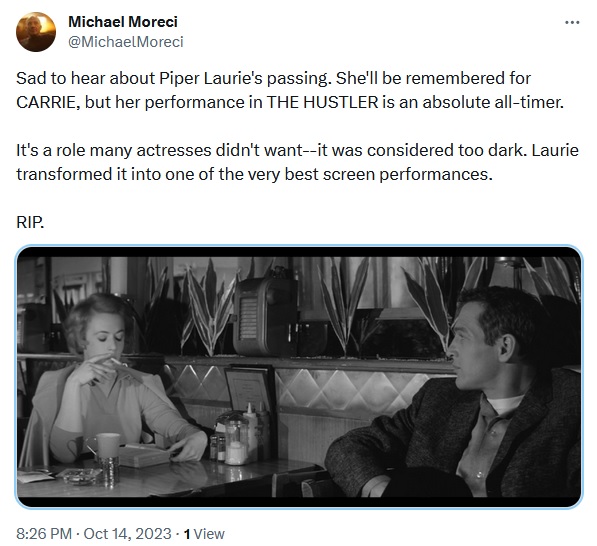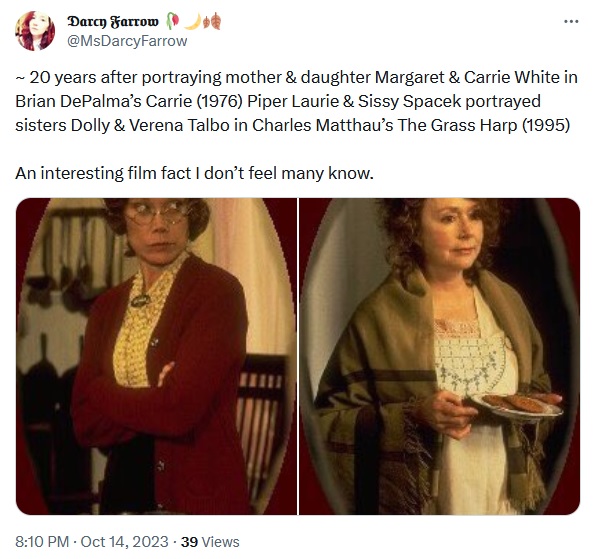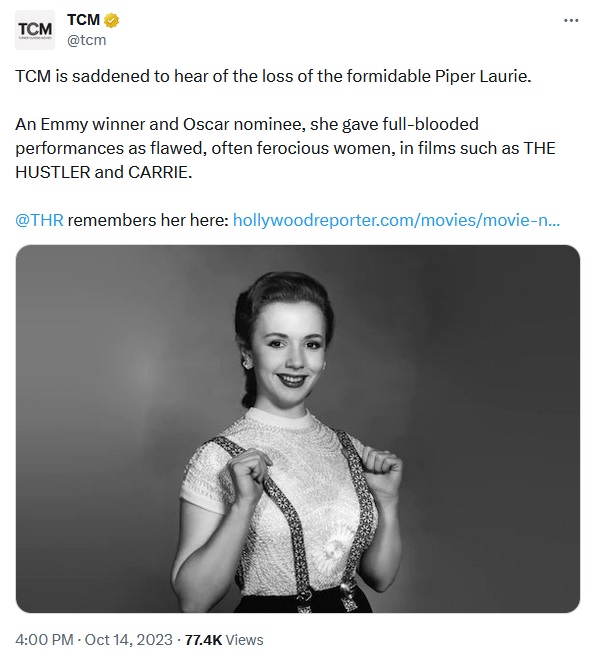"SUBCONSCIOUSLY I THINK I GAVE MYSELF PERMISSION TO BE OVER THE TOP & LARGER THAN LIFE"
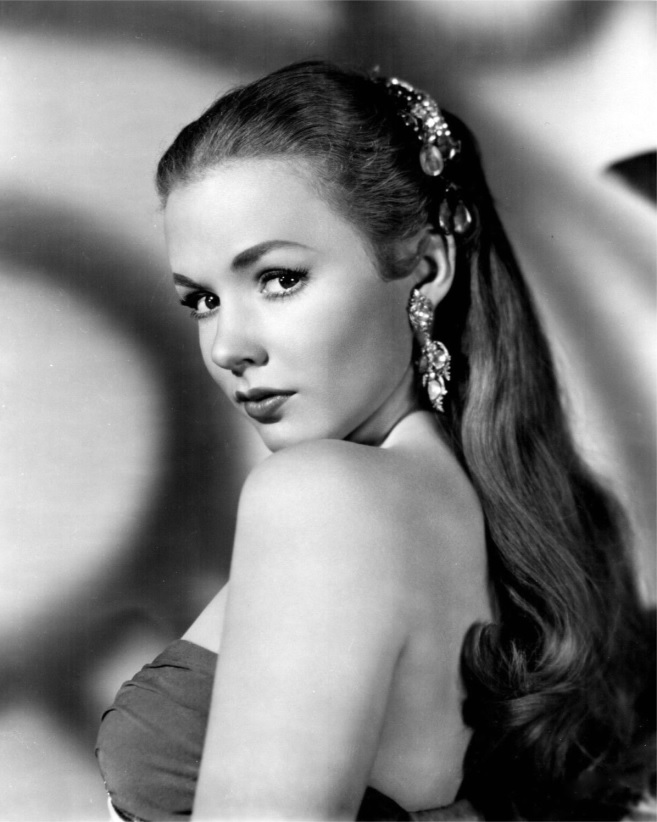
Piper Laurie posed for the photograph above in 1953, more than two decades before she so memorably portrayed Margaret White in Brian De Palma's adaptation of Stephen King's Carrie (1976). As The Hollywood Reporter's Mike Barnes reports, Laurie passed away earlier today:
Piper Laurie, the three-time Oscar-nominated actress known for her performances in The Hustler and Carrie and for her outlandish two-character, two-gender turn on the original Twin Peaks, died Saturday morning in Los Angeles. She was 91.Laurie had not been well for some time, her rep, Marion Rosenberg, told The Hollywood Reporter.
Piper Laurie's early career in the 1950s included work in live television drama, directed by greats such as Sydney Lumet and John Frankenheimer (the latter for Days Of Wine And Roses). After starring with Paul Newman in Robert Rossen's The Hustler (1961), she made a decision to leave the film industry to get to know herself better. She got married, had a daughter, and didn't make another film for 15 years, until De Palma cast her in Carrie. She was Oscar nominated for both The Hustler and Carrie, and then again for her role in Randa Haines’ Children Of A Lesser God (1986). She later worked with David Lynch, on the first two seasons of Twin Peaks (1990/1991). Through the years, Laurie appeared in many more films, including Walter Murch’s Return To Oz (1985), Norman Jewison’s Other People’s Money (1991), Dario Argento's Trauma (1993), Sean Penn’s The Crossing Guard (1995), and Robert Rodriguez’ The Faculty (1998).
In Lee Gambin's book, Like Being on Mars: An Oral History of Carrie (1976), Laurie says that she "absolutely used immense amounts of stagecraft with the role" of Margaret White. "I think it definitely needed to go there, to get to those operatic and grandiose theatrical levels. I watched Brian's movie Phantom Of The Paradise a few times before doing Carrie, and I saw how operatic and over the top that was! So subconsciously I think I gave myself permission to be over the top and larger than life. I think that benefits such a wonderfully operatic story. It is really an extension of a heightened reality!"
Regarding Laurie's time on Twin Peaks, Barnes writes:
After Laurie’s unscrupulous Catherine Martell of the Packard Sawmill presumably had perished in a fire during the first season of ABC’s Twin Peaks, series co-creator David Lynch called her and said he wanted the actress to return for season two — to play Martell disguised as a man.“‘What kind of man is going to be up to you,'” she said he told her. “‘You could be a Mexican, a Frenchman, whatever you think.’ I was beside myself with the power to be able to pick my part like that. I decided I would be a Japanese businessman because I thought it would be less predictable.”
Incredibly, the cast and crew were kept in the dark about this. Laurie was told not to tell anyone — not even her family — that she was back on Twin Peaks, and her name was kept out of the credits. And so, sporting a black hairpiece, Fu Manchu mustache and dark glasses, Laurie arrived on the set as actor Fumio Yamaguchi, there to portray the character Mr. Tojamura.
“The cast would never come very close to me,” Laurie said. “They were told to be respectful to this actor who had come over from Japan specifically for the show and had only worked with [Akira] Kurosawa.”
She said that, eventually, some in the cast began to realize something was amiss — but Peggy Lipton, Laurie noted, thought Yamaguchi was actually Isabella Rossellini in disguise.
The actress earned Emmy noms in 1990 and 1991 for her work on the show.
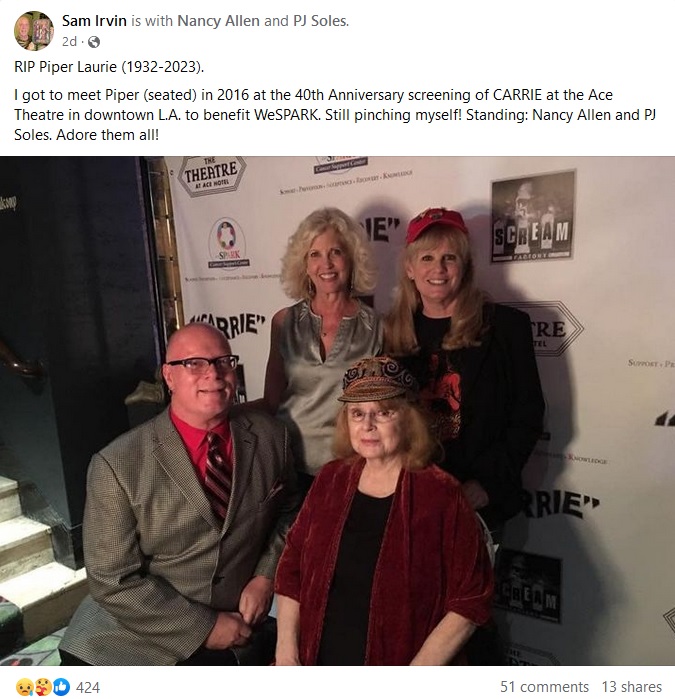
From Dan Callahan's tribute to Piper Laurie at RogerEbert.com:
Thoughts about Piper Laurie must begin with the darkness and throatiness of her mature speaking voice and the frightening directness and strength of her gaze, which could seem nearly Satanic sometimes, as if she were intimately aware of all the worst that life had to offer. She had been born Rosetta Jacobs to Jewish parents in Detroit, and it was only after signing a contract at Universal that she got her new name. Laurie never thought seriously of discarding that name from her ingenue days, even when its incongruous birdlike cheerfulness became so at odds with the watchful quality she was so apt to offer to the camera, with its hints of unspeakable depravity.In the 1950s, Universal put out lots of cockamamie press stories about its young starlet; in one of them, the young Laurie supposedly only ate flower petals. In her colorfully indiscreet 2011 memoir “Learning to Live Out Loud,” Laurie writes of how she lost her virginity to future-president Ronald Reagan after they starred together in a movie called “Louisa” (1950), and she is unsparing about how coldly technical and un-romantic this was (she claimed that Reagan even told her how much money he spent on condoms). Laurie made pictures with Tony Curtis and Rock Hudson and looked pretty in Technicolor, but only those watching very closely may have discerned that there was something more to her than what Universal required, something like a bomb that needed to go off.
By the late 1950s, Laurie was fed up with Hollywood and went to New York to study acting. It wasn’t easy to live down her past or get casting agents and directors to take her seriously, but Laurie made a serious impression on live TV when she played an alcoholic in “Days of Wine and Roses” (1958) for director John Frankenheimer. This eventually led to her getting the role of Sarah Packard in Robert Rossen’s “The Hustler” (1961) opposite Paul Newman, a performance that earned her an Academy Award nomination for best actress and put Laurie on a new level.
Laurie’s Sarah Packard is an alcoholic, and she walks with a limp. Any man with sense would know right away that Sarah is trouble with a capital “T,” and she tells Newman’s “Fast” Eddie Felson to his face that she is trouble, and a bad lot, and not worth bothering about. But Sarah Packard has a kind of allure in her consummate solitude; there is something somehow glamorous even about her self-loathing.
How does Sarah earn her living? Sarah tells Eddie that she is living off what the last rich man she was with gave her, and so she has been around the block more than a few times. When she was younger, Sarah had tried to be an actress, but that’s all finished; now she mainly drinks and broods. When she isn’t drinking, Sarah takes college classes, but without any ultimate aim in mind. The look on Sarah’s face is so isolated and so self-destructive that it is as if ultimate aims are beneath her. She hates herself so much that there is something untouchably romantic about her.
“The Hustler” remorselessly charts the hopes that begin to grow in Sarah that she might actually deign to accept the love of another human being and then their final destruction when she enters the orbit of Bert Gordon (George C. Scott), a man who wants to exploit Eddie’s talent for pool playing and sees Sarah as an encumbrance. Bert says things meant to wound Sarah, and she begins to crumble away. There comes a point when Bert whispers something in Sarah’s ear, and we never find out what it was, but it is so bad that she is finished by it; she cannot go on any further.
Laurie’s Sarah Packard is a woman who once had many possibilities, and she still has them almost up to the end; all it takes is one more bit of deliberate cruelty to destroy her, and Scott’s Bert Gordon tips that scale for her. This is tragic, because Sarah Packard isn’t the sort of person who is a hopeless case, but she is too sensitive, and she is also perverse, and that is a deadly combination.
Laurie did not capitalize on her success in “The Hustler.” Instead, she married the film critic Joe Morgenstern and didn’t make any more movies until she was offered the role of the religious fanatic mother Margaret White in Brian De Palma’s “Carrie” (1976), in which she gives one of the campiest performances of all time even though Laurie plays it all with such a straight face. It was that poker face of hers that let Laurie get away with anything in this movie and somehow still seem serious and seriously scary, even when Margaret speaks of the “dirty pillows” of her daughter Carrie (Sissy Spacek) and runs around smiling with a large knife, her long, curly hair flowing behind her.
“Carrie” brought Laurie another Oscar nomination, this time for best supporting actress, and Laurie obtained far more work now after this second comeback. She headlined a horror vehicle for director Curtis Harrington called “Ruby” (1977), played Judy Garland’s fearsome stage mother on television in 1978, and was flat-out terrifying as Magda Goebbels in “The Bunker” (1981), especially in the scene where she poisons her own children.
But Laurie gave maybe her most perverse performance of all as a well-to-do woman who develops a yen for a mentally handicapped young hunk (Mel Gibson) in “Tim” (1979), which is meant to be a sentimental love story but is steered directly into the most disturbing possible direction by Laurie from the moment her character first sets eyes on her young prey in his tight shorts (in her memoir, Laurie wrote that she slept with Gibson shortly after the shooting wrapped, for she wasn’t shy about detailing such perks of her profession).
Laurie worked quite a bit in the 1980s, getting one more Oscar nomination for “Children of a Lesser God” (1986) in the supporting category. But it was in 1990 that she received a role that will stand with her Sarah Packard and her Margaret White for her legacy: the authoritative Catherine Martell on David Lynch’s classic surreal TV series “Twin Peaks,” an unscrupulous lady who will stop at nothing to get what she wants, the inverse of the romantic loser Sarah Packard.
Updated: Monday, October 16, 2023 6:39 PM CDT
Post Comment | Permalink | Share This Post




